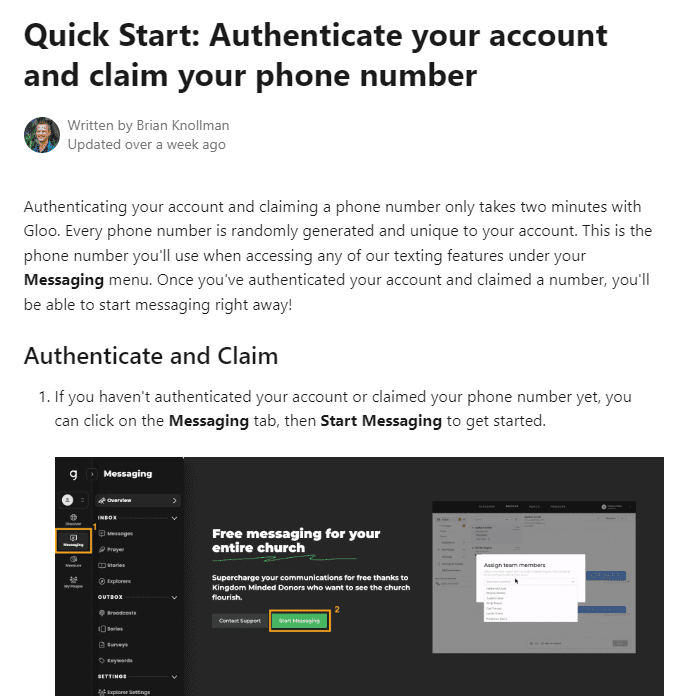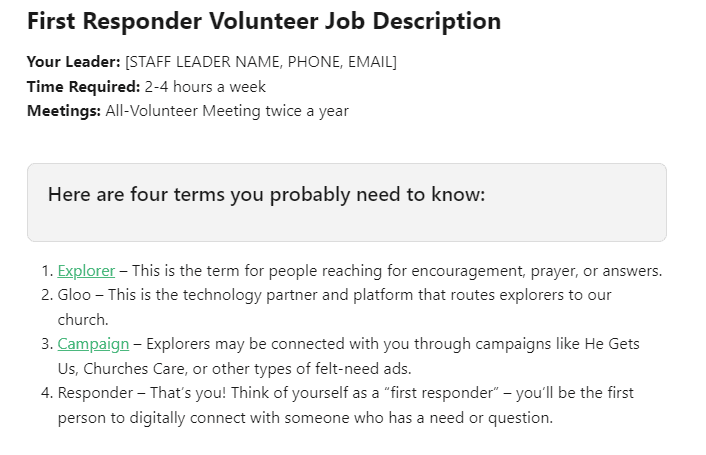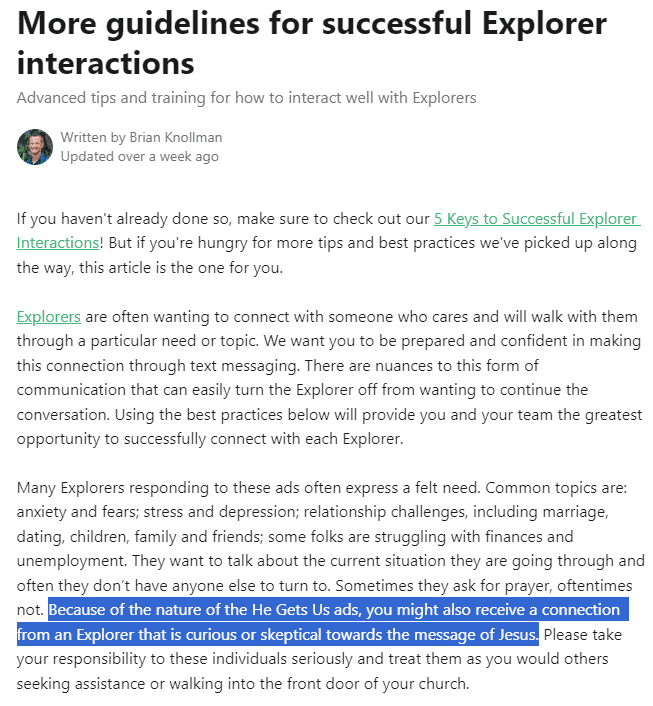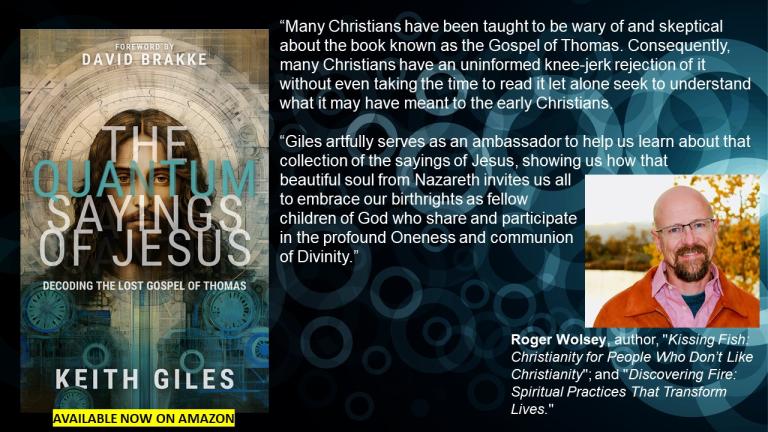
NOTE: Names were changed in this story to protect the identity of those involved.
UPDATE: See response from “He Gets Us” at the bottom of this article for updates as of 5/7/2024.
Imagine, you’ve had a bad week and you’re scrolling down your Instagram feed when you see an ad for “He Gets Us” – that Super Bowl Commercial where people show love and compassion to people in need. It moves you. At the end, there’s a link where you can have someone local talk to you about how you’re doing and pray for you. It sounds great, but you’re skeptical. So you follow the link to their website and check it out first.
Under the FAQ you read this:
“Is He Gets Us trying to get people to go to Church?” and the answer is, “No, He Gets Us is not against the church, but we are not a back to church campaign. We are hoping to help people consider who Jesus is and why that matters.”
That makes you feel better, so you sign up.
A few days later, you get a text from someone local who says, “Hey, I saw you were going through a hard time. I’m so sorry about that. How can I pray for you?”
So, you share what’s been going on with this perfect stranger on your phone, trusting that there’s no agenda other than a desire to listen and to help.
But you couldn’t be more wrong.
LOOKING FOR SUPPORT
The scenario above is almost exactly what happened to El Pasoan Kathy Wilson when she saw an ad on Instagram offering to connect her with someone local and share messages of support.
She entered her name, cell number and zip code into the app.
Soon, she began receiving texts from Janice, a local pastor’s wife who gained her trust and then betrayed it in the most hurtful way possible.
PUBLIC BETRAYAL
Pastor Janice was speaking at a women’s conference out of state. To emphasize the need for their women to reach out to their lost friends, Janice shared a story of how their church used a service from a company called “GLOO” to receive cell phone info from local women who were looking for emotional and spiritual support.
She then explained to them, in great detail, how GLOO collected data from people who responded to the “He Gets Us” campaign and shared their text info with pastors for outreach.
What happened next was horrifying.
Janice pulled out her phone and proceeded to read Kathy Wilson’s very intimate, personal and private text messages to every woman at the conference.
Janice then continued to share even more private information about Kathy. She mentioned what Kathy did for a living, what days of the week she was at a certain public place offering services to her clients, and what city she lived in.
Later, that sermon was uploaded to the church website in El Paso where Janice and her husband were pastors.
CHRISTIAN DATA MINING
The ads that Kathy responded to on Instagram were carefully designed by the people at He Gets Us as a way to capture the personal data of people who are emotionally and spiritually vulnerable.
He Gets Us is not the only Christian organization advertising these “get prayer support” offerings on social media. Other Christian ministries like K-LOVE [the nationally syndicated Christian radio station], and Churches Care do the same. But, once they have this information, what do they plan to do with it?
Simply put, their goal is to collect this private information and sell it to an organization called GLOO who then sells that information to local pastors seeking to grow their churches.
According to GLOO, a US-based Christian Data-Mining Company started by Scott and Theresa Beck in 2013, their mission is to “help ministry leaders scale their impact through technology.” To do that, they purchase meta-data from a variety of groups like He Gets Us, K-Love, Barna Research, and other organizations, to create a database of potential targets – like Kathy Wilson – and then they sell that data on their platform to more than 38,000 churches who sign up for their “Explorer” program.
Here’s how it works, according to GLOO’s own website:
“GLOO enables cooperative outreach by partnering with a wide range of campaign partners, including K-LOVE and He Gets Us. One partner, Churches Care, runs digital ads on channels like Facebook, Instagram, and Google on topics including faith, relationships, vocation, finance and health. When a person responds to an ad, they can provide their information to be connected to a church in their local area. The church can message the individual directly through the Gloo platform and help them with their inquiry, often resulting in the person receiving prayer, help for a need and even visiting that church in person.”
But, as in Kathy Wilson’s case, giving churches free access to “people in need” can be dangerous.
INVITATION DENIED
When a new friend invited Gustavo to attend a local church prayer meeting, he felt conflicted. Should he just say “no” and hope they got the hint? Or should he try to be polite and tag along?
Gustavo has been deconstructing his Christian faith for several years. He even stopped going to church in his hometown of El Paso and mostly listened to sermons on YouTube.
Before making a decision about attending the prayer meeting, Gustavo decided to check out the church website. He found a few sermons online and started to listen.
That’s when he heard the pastor’s wife, Janice, share intimate details about a specific woman who lived in El Paso. He was horrified. How could someone betray another person’s trust like that, he wondered?
After listening to the sermon, Gustavo opened Google and in less than 5 minutes he had found Kathy Wilson’s personal information, including her picture, her phone number and details about the work she did.
“If I could do that, anyone could,” he thought.
CONNECTING THE DOTS
Last week, when Gustavo and I were having coffee, he told me this story you’re reading right now. That’s when I decided to try and contact Kathy Wilson to let her know who she was texting with and how her information was being abused.
The next morning I looked up the Church website where Janice and her husband were pastors. I found the sermon and after listening to it, I decided to do a little Google research of my own,
As Gustavo had done, I had located Kathy Wilson’s personal information. In less than 5 minutes, I was looking at Kathy Wilson’s face on the screen. I could see where she worked, the address, and even her phone number.
That was too easy.
CLOSING THE LOOP
Finding Kathy Wilson’s Facebook page wasn’t very hard, so I sent her a private message on Messenger that said:
“Hello, I thought you should know how I found your page on Facebook was from Janice, the woman who has been texting you about your “prayer requests.” She’s the wife of the pastor of [Redacted] Church and she has shared [read out loud] your personal, private texts about feeling alone, suffering, etc. in her sermons which are available online for anyone to listen to. I feel this is a huge violation of your trust and your privacy….I thought you should know.”
“Her sermon where she mentions your personal and private details is here [LINK REDACTED]”
Kathy responded within the hour and thanked me for letting her know what was going on.
CONFRONTING THE PASTOR
Based on this information, Kathy confronted Janice about the betrayal. To her credit, Janice did not defend her actions but freely admitted her mistake and offered a sincere apology.
After sharing the recording with her lawyer, Kathy sent a message to Janice asking her to publicly apologize to the woman in El Paso that she had betrayed by sharing intimate, private communications with the congregation, and a written apology stating that she would never do anything like this again to anyone else.
A few hours later, the sermon was removed from the church website with the message:
“We are so sorry but the recording for this message has been lost or become corrupted but we hope you’ll find other resources on this page that will be helpful to you.”
MAKING THE GLOO CONNECTION
Soon after all of this, I began to dive a little deeper into researching how “He Gets Us” and local churches share intimate private data to target vulnerable people like Kathy.
I had already made the connection between GLOO and “He Gets Us” thanks to the very specific details Janice had shared about how everything worked in her sermon. So, I started looking for information. Here’s what I learned:
Anyone can sign up for a GLOO account at www.GLOO.us
I was able to sign up for free using only my email address.
I was given a unique Gloo Phone number where people’s texts can be forwarded to me via “He Gets Us” and other data-mining organizations.
No one at GLOO asked if I was a pastor, or if I was on staff at a church, or if I had a 501C3 or any other documentation to prove I was representing a church.
From there, I found what they call the “Explorer” program which is exactly the trap that Kathy Wilson found herself in with Janice.
Here’s how they describe it on their website:
DATA EXPLORERS
If you have a Gloo Premium account and your account status is set to Active, then we will automatically match Explorers with your account! You don’t need to do anything but sit back and wait. Once an Explorer is matched with your account, they will automatically be created in your People tab and assigned to a Group called Explorers.

They explain their purpose strategy in this press release:
Gloo Connects 150,000 People Across the U.S. to Local Churches
“Gloo, the leading technology innovator whose platform releases the collective might of the faith ecosystem, celebrates the milestone today of connecting 150,000 people across the United States to churches in their local communities.
One way Gloo connects is through outreach ads, content, prayer and events run by Gloo’s campaign partners.
When individuals intersect with these partners and reach out with questions about faith or the need for prayer and help, they have the option of connecting with a church in their local community.
When they opt in, there is a responding church on the other end, ready to serve.
According to their website, GLOO launched in July 2021 in only five cities by running ads with one campaign partner – Churches Care. But, today, they have expanded to cities nationwide with 10 campaign partners.
Their goal is to eventually grow their database to over 1 Million people.
UPDATED: While “He Gets Us” claims they have never sold user data to Gloo as part of their Explorer Campaign, Gloo’s website begs to differ – [SEE ITEM 3 BELOW]

So…if He Gets Us “does not, and has not, sold data to Gloo” and “No Gloo user may currently sign up to receive texts or connect with individuals via He Gets Us.”, then all we can conclude is that either: Gloo is lying about receiving user data from “He Gets Us”, OR “He Gets Us” did not sell user data to Gloo.
Perhaps they gave it away for free?
Here’s yet another screenshot from the Gloo website where they explicitly connect user data collected from “He Gets Us” ad campaigns and their Explorer program: [SEE BLUE HIGHLIGHTED TEXT AT THE BOTTOM OF THIS SCREENSHOT

Clearly, the Explorer Program at Gloo was once powered by data received from “He Gets Us” ads.
FROM EXPLORERS TO EXPLOITERS
So, here are a few problems I see with what GLOO and organizations like He Gets Us are doing here:
First of all, they are lying to everyone who gives them their information. Their website says “No. He Gets Us…is not a back-to-church campaign.” But, if they are selling your information to Gloo who then sells it to local Church leaders who then use that data to evangelize you, then they certainly are using your data to try to get you to go to Church. That’s, in fact, the entire point.
Secondly, Gloo and He Gets Us make it much easier for those abusers to gain access to more vulnerable people in their communities. Gloo doesn’t vet who they sell their data to for $49.99 per month. Anyone with a credit card can access this local personal database of “hurting, lonely and suffering people” and have their info sent to their personal cell phones, no questions asked.
Third, we have all learned the hard way that anyone who is a sexual predator or abuser can find endless opportunities by becoming the pastor of a church. Youth leaders, Sunday School volunteers, Childcare workers, worship leaders, and of course Senior Pastors have all been known to take advantage of vulnerable people under their care.
VIOLATING TRUST
What happened to Kathy Wilson is horrible. Her betrayal by a local pastor who pretended to care about her needs but secretly used her as a sermon illustration is beyond comprehension.
I can’t help but wonder how many other people have had their personal data misused in this same way, or worse? What prevents another pastor or pastor’s wife from taking advantage of someone who is emotionally distraught or in need of help?
GLOO doesn’t seem very concerned about those dangers.
The people at He Gets Us won’t even admit they’re selling personal data to those who might abuse it.
LEARNING TO FORGIVE
The end to Kathy’s story is a good one. Janice fully apologized via text and admitted that what she did was unforgivable. She also promised to record another sermon and to post it online at their church website to correct her mistake.
Kathy, although she is not a Christian, forgave Janice for what she did and asked me not to include any details of their conversation or the name of the church.
Hopefully, Kathy’s story is one that can help us realize the dangers of blindly trusting anyone with our personal data. Especially not any organizations like “He Gets Us”, “K-Love” or any other organization selling our data to GLOO.
Bottom line: Be careful when it comes to trusting Christians who assure you that they’re not trying to sell you something.
As we’ve seen, more likely than not, they’re either trying to sell you something, or they’re selling your information to someone else.
As for Kathy, she seems to have the best perspective possible. “I learned some valuable lessons in this experience,” says Kathy. “This is a reminder for Janice – and for all of us – to go back to that place of serving others from the heart, like Jesus wanted…uniting us all through compassion, kindness and love. These are humbling experiences, but they make us greater people.”
NOTE: If you have had a similar experience of a church minister or staff member misusing your personal data after responding to an ad on Instagram through “He Gets Us”, “K-Love”, “Barna” or some other online Christian ministry, please contact me. I’d love to hear your story.
UPDATED: After publication of this article on May 6, 2024, I was contacted by the new owners of “HE GETS US” and asked to share this statement below:
“A new nonprofit, Come Near, took over responsibility for He Gets Us activities beginning in late 2023. During the organization’s review of service providers, Gloo-related activities on behalf of He Gets Us were paused in February 2024. Previously, Gloo helped churches and supporters interested in being involved with He Gets Us stay connected to the movement. Gloo also managed an online chat and text-to-chat service, which He Gets Us discontinued in February 2024.
“He Gets Us does not, and has not, sold data to Gloo. No Gloo user may currently sign up to receive texts or connect with individuals via He Gets Us.
“He Gets Us does not have an agenda to recruit people to any particular church. He Gets Us is intended to invite all people to explore Jesus’ life and the examples of compassion and love Jesus lived — on their own terms.
“Come Near constantly evaluates collaborators of He Gets Us and partnerships with the faith community to align with those who support raising the relevancy of Jesus.”
AUTHOR’S NOTE:
To date [May 7, 2024] representatives from the new “HE GETS US” organization have not responded to my questions about why GLOO lists them and K-Love and others as partners on their website, saying: “GLOO enables cooperative outreach by partnering with a wide range of campaign partners, including K-LOVE and He Gets Us.”
In what way did “HE GETS US” and K-Love “enable cooperative outreach” in their partnership with GLOO? And what were some of those “campaign partners” collaborating on, if not sharing user data collected from their various online social media campaigns?
Further updates as they are received.
**

The newest book from Keith Giles, “The Quantum Sayings of Jesus: Decoding the Lost Gospel of Thomas” releases TODAY on Amazon. Order HERE>
Keith Giles is the best-selling author of the Jesus Un series. He has appeared on CNN, USA Today, BuzzFeed, and John Fugelsang’s “Tell Me Everything.” He hosts the Second Cup with Keith podcast, and co-hosts the Apostates Anonymous podcast, and the Heretic Happy Hour Podcast.

















